
OceanPact signs contract with Petrobras for three-year FPSO mooring inspections
Dec, 08, 2023 Posted by Gabriel MalheirosWeek 202345
OceanPact, a Brazilian company specializing in environmental solutions, submarine services, and logistics and engineering support, has emerged victorious in a competitive bidding process and signed a contract with Petrobras for the inspection of mooring systems on FPSOs (Floating Production Storage and Offloading) and semi-submersible platforms until 2026.
The contract worth approximately BRL 485 million, a result of OceanPact’s successful bidding, encompasses the inspection of platform mooring systems, covering around 1,500 kilometers of mooring lines and 600 links.
Both inspection and cleaning of these systems are regulatory requirements mandated by classification societies and serve as crucial mechanisms for ensuring the operational safety of the platforms.
The vessel selected by OceanPact for this undertaking is the Austral Abrolhos, an MPSV (Multi-Purpose Support Vessel) equipped with a Work-Class Remotely Operated Vehicle (ROV). Specifically designed for underwater operations and featuring a crane capable of activities at depths of up to 2,000 meters, the Austral Abrolhos is not only constructed to handle submarine tasks but also has the capacity to transport water, diesel oil, drilling fluids, parts, components, and other supplies destined for the platforms. Additionally, the vessel is equipped with emergency response equipment.
The ROV Work Class, manufactured by the Norwegian company Kystdesign, is outfitted with high-resolution camera systems, various sensors, and tools, operating at depths of up to 3,000 meters.
-
Ports and Terminals
Oct, 26, 2020
0
Vessel refueling at Paraná ports rises 13% YoY
-
Ports and Terminals
Sep, 12, 2019
0
Navigational Depths of the Port of Itajaí Record Historical Measurements
-
Economy
May, 23, 2024
0
AEB: Argentina’s Economic Woes Impact Bilateral Trade with Brazil
-
Ports and Terminals
Dec, 03, 2019
0
Study indicates that THC prices released by shipowners are in line with those practiced in major Brazilian port complexes

